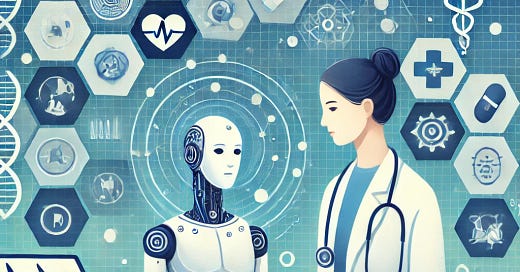The AI Revolution in Healthcare: Hope or Hype?
Hey health-conscious readers,
Artificial Intelligence (AI) is no longer a futuristic fantasy; it's rapidly transforming various aspects of our lives, and healthcare is no exception. From diagnosing diseases to developing new drugs, AI is poised to revolutionize the way we prevent, treat, and manage illnesses. But is this a cause for celebration or concern?
The Promise of AI in Healthcare:
AI offers a wealth of potential benefits in the healthcare sector:
Early detection and diagnosis: AI algorithms can analyze medical images and data to detect diseases like cancer and Alzheimer's at earlier stages, when treatment is often more effective.
Personalized medicine: AI can analyze a patient's genetic makeup, lifestyle, and medical history to tailor treatment plans and predict their response to different medications.
Drug discovery and development: AI can accelerate the process of drug discovery by analyzing vast amounts of data and identifying promising drug candidates.
Improved efficiency and accessibility: AI-powered tools can automate tasks, streamline workflows, and improve access to healthcare services, especially in underserved areas.
Reduced costs: AI can help reduce healthcare costs by optimizing resource allocation, preventing unnecessary procedures, and improving patient outcomes.
Real-World Examples:
PathAI: This company uses AI to improve the accuracy of cancer diagnosis and treatment.
IDx Technologies: Their AI-powered system can detect diabetic retinopathy, a leading cause of blindness.
Atomwise: This company uses AI to discover new drugs and therapies.
Babylon Health: Their AI-powered app provides personalized healthcare advice and connects patients with doctors.
The Challenges and Concerns:
While the potential benefits of AI in healthcare are vast, there are also challenges and concerns that need to be addressed:
Data privacy and security: Protecting patient data is crucial, and AI systems must be designed with robust security measures to prevent breaches and misuse of information.
Bias and fairness: AI algorithms can perpetuate existing biases in healthcare if they are trained on biased data. Ensuring fairness and equity in AI applications is essential.
Ethical considerations: The use of AI in healthcare raises ethical questions about decision-making, accountability, and the potential impact on the doctor-patient relationship.
Regulation and oversight: Clear regulations and oversight are needed to ensure the safe and responsible development and deployment of AI in healthcare.
The Future of Healthcare:
AI has the potential to transform healthcare in profound ways, improving patient outcomes, reducing costs, and increasing access to care. However, it's crucial to address the ethical, legal, and social implications of this technology to ensure its responsible and equitable use.
By staying informed and engaging in the conversation about AI in healthcare, we can help shape a future where technology empowers patients and providers alike, leading to a healthier and more equitable world.
Stay informed and stay healthy,
Rishi Gottimukkala





